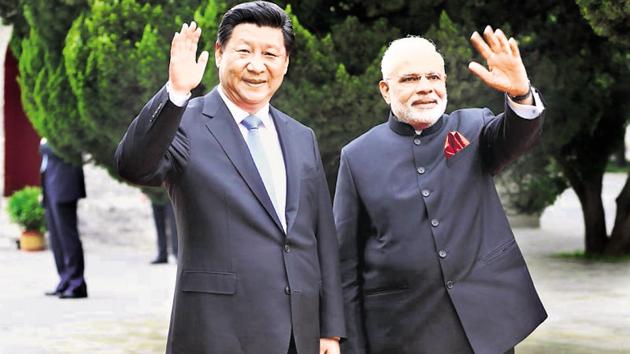PM Modi likely to detail India’s war on terror, economic push in talks with Xi
Modi and Chinese president Xi Jinping are expected to talk “heart-to-heart” on issues that are tied to national interests and their plans for “national rejuvenation.”
Prime Minister Narendra Modi will bring with him a sense of guarded optimism about the future of bilateral ties with China when he reaches Wuhan, the capital of Hubei province, around Thursday midnight for an informal summit with Chinese president Xi Jinping.

The two leaders are expected to talk freely and “heart-to-heart” on issues that are tied to national interests, their plans for “national rejuvenation” and factors that are slowing down these proposals even though there is no structured agenda for the talks on Friday and Saturday.
READ: When Modi and Xi talk in China, only one other Indian will be present
Modi, for one, is expected to lay out the details about India’s fight against cross-border terrorism and its impact on the security situation in his country.
He may talk at length about his ongoing attempts to revitalise India’s economy and share details about policies he has in mind for the future and the rationale behind those he has already implemented.
The Prime Minister could share with Xi the planning that went before India demonitised two high-value currency notes in 2016, a move that was closely watched in China.
He also has the opportunity to share his plans to improve India’s infrastructure with Xi and where China with its vast experience in the sector could come.
Both the countries discussed cooperation in the infrastructure sector at the fifth Strategic and Economic Dialogue (SED) recently held in Beijing. The core message from the dialogue was that, “We (India and China) must focus incessantly and unremittingly on the development cooperation possibilities despite differences”.
On Xi’s part, it’s hard to believe that he will let go of this opportunity to convince the Indian Prime Minister about his legacy project, the Belt and Road Initiative (BRI).
“Participation in China’s Belt and Road is often in the eye of the beholder. Some countries have signed onto the effort but have yet to receive any tangible benefits. Others have not endorsed the Belt and Road but have done business deals that would otherwise fall under the Belt and Road’s broad and ever-expanding banner of activities,” Jonathan Hillman of the Center for Strategic and International Studies said.
“India is a good example. It has been critical of the Belt and Road because it passes through Pakistan-occupied Kashmir and includes investments in ports and other projects that could have strategic value,” Hillman, the director of the Reconnecting Asia Project at the Washington-based centre, said.
He said the formal membership in the BRI isn’t a prerequisite for doing related business with China.
“I don’t think India will endorse the BRI soon. But it shouldn’t stop trying to expand other economic ties with China,” he added.
The last ten months in Chinese-Indian diplomacy, from the tense faceoff in the Doklam plateau to the remarkable turnaround and pre-summit optimism in Wuhan, is a snapshot of the layered ties between the two Himalayan neighbours.
The standoff on the Bhutan plateau – claimed by Thimpu but under Beijing’s control now seems like a military and diplomatic nightmare fairly long back in the past in the backdrop of this week’s meeting between Modi and Xi. The two countries have other deep differences.
The Doklam standoff was preceded by the Dalai Lama’s visit to Arunachal Pradesh, India boycotting the Belt and Road forum in Beijing, the continuing impasse over New Delhi’s inclusion in the Nuclear Suppliers Group and China fully backing Pakistan in blocking terror suspect Masood Azhar’s proscription at the UN.
Diplomats on both sides have repeatedly said that the summit is informal in nature without any agenda for talks, which could mean that at the end of it, there could be little in terms of concrete takeaways.
But the fact that the two leaders agreed to hold a summit of this nature reflects that they are looking to find a broad consensus to base their relationship and take it forward.






